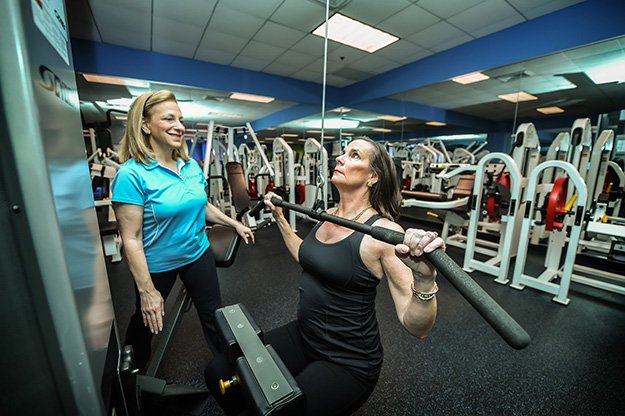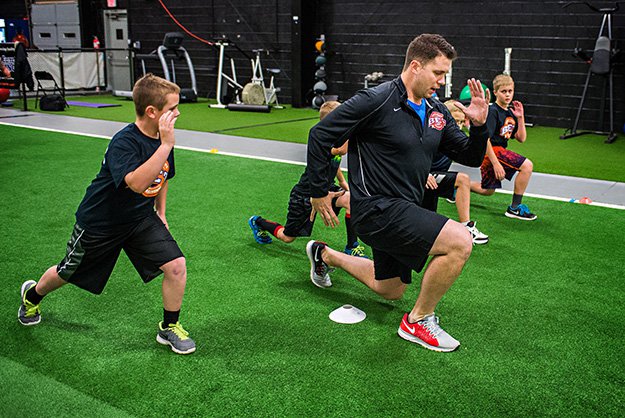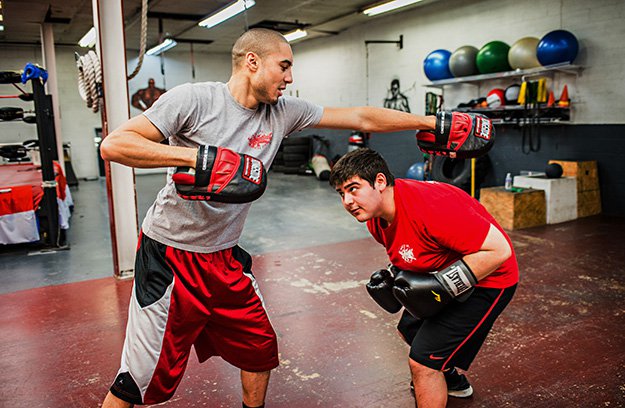Four local personal trainers are transforming lives every day — helping individuals of all ages and backgrounds reach their personal health and fitness goals, whether these are living healthier lifestyles, reshaping their bodies or becoming stronger athletes. These fitness professionals don’t use magic pills or guarantee overnight results. Instead, they use their very own passion for being healthy, fit and active to motivate their clients to make a life-long commitment to healthy living.
Read how personal trainers John Monteleone, Sarah Small, Pete Rowley and Erik Spring are improving their clients’ overall well-being — while boosting their confidence — through proper exercise and nutrition.
John Monteleone
On Training Men
Healthy living is a lifelong commitment that personal trainer John Monteleone preaches among his clients of all ages.
“Make it a way of life,” Monteleone recommends of eating healthy and staying active, “so you have quality of life.”
“Quality of life” is the number one reason individuals approach Monteleone for training at Wyomissing Fitness and Training in Wyomissing. They also want to lose weight, be stronger, rehabilitate following an injury, or be better prepared for a cross-training competition.
“It’s about the individual,” says Monteleone, who has a kinesiology degree from Penn State and numerous other health and fitness certifications. “I find out their goals and put together a program tailored to them. Everyone’s programs are going to be different. It’s not a one-size-fits-all.”
Monteleone is Head Trainer at the fitness center and has anywhere from 90 to 100 appointments each week. Clients range from teenagers to senior citizens.
Monteleone’s passion is coaching his clients on their health journey. “I love helping people while always emphasizing quality,” he shares. “That’s why I get up at 3:30am, Monday through Friday. If my clients are motivated to come here at 5am, then I want to match their level.”
In his eight years of experience in the fitness industry, Monteleone has witnessed many triumphs among his clients. He speaks about a 64-year-old woman who was training with him to overcome knee surgery, and within two months, she was mobile without braces and a cane. He talks about a 24-year-old man who gained 30 pounds of muscle in 14 months to compete in a cross training competition. And he proudly shares the story of a 32-year-old woman who lost 100 pounds in 14 months through proper training and nutrition.
Just like goals vary by individual, health programs additionally differ between men and women. Monteleone proposes the following fitness tips for men:
1. Train your legs. Many men tend to focus on building a muscular upper body while neglecting the lower half. Monteleone suggests squats, lunges and single leg dead lifts. “You don’t build a house starting from the roof. You build from the ground up,” he says.
2. Know your limits. “Using too much weight can put you in a position of compromising form and technique and increases your risk for injury,” he says. “Using lower weights with proper technique can still be effective.”
3. Develop proper eating habits. “Have a disciplined eating program, whether you’re eating after a workout to increase size or eating before a workout to lose weight,” Monteleone suggests.

Sarah Small
On Training Women
With more than three decades in the business, personal trainer Sarah Small has seen the world of fitness transition from strictly body image to overall well-being.
“Fitness is not about what we see in the mirror or having the perfect body; it’s become more about overall health,” Small explains. “Clients are considering weight management but also blood pressure, cholesterol, heart health and especially family history. People today are being more proactive about their well-being.”
Small is the owner of Alliance Fitness Center in Wyomissing, a personal training and corporate wellness company concentrating on individualized personal training and small group fitness for people of all ages. While she oversees the center’s operations, including a staff of eight personal trainers, her passion is 1-to-1 personal training.
Alliance Fitness Center has a wide range of clients – from high school athletes to those well into their 80s. A national fitness conference educator and presenter, Small has a seen a big change in recent years with her female clientele. They are coming to her and the Alliance team with different goals at every stage of life.
“As trainers, we take into consideration a woman’s history,” Small shares. “Where are they in their life? Are they having back or joint issues? What is their activity level? We know that goals and programs will be different for women at 30, 40, 50, 60 and beyond.”
For those battling weight loss, Small’s approach is to take the emphasis off the scale. “It’s about feeling healthier and looking better, and how the clothes are fitting,” she says. “It’s inch loss versus weight loss. I think that transcends at any age.”
Small’s biggest client success stories, however, don’t revolve around lost pounds only. Fourteen years ago, a 62-year-old woman came to Small with a desire to ski until she’s 80. Today at 76, she trains three times a week at the Alliance Fitness Center and is not only still skiing, but also continuing to participate in other sports, from golf to tennis. “This client is an inspiration to all,” says Small. “She is making fitness and good nutrition her complete lifestyle choice.”
Small works with clients with neurological issues and feels a great sense of joy when she witnesses them increase their mobility, functionality and balance, and reduce back and joint pain.
Regardless of a woman’s age or goals, Small challenges every woman to start making changes today. “Make the commitment to take care of yourself, and you will be better able to take care of others,” she says. “Seek the advice of a professional personal trainer, even if it’s short-term, just to get you started. Have your goals prepared. And do your research on personal trainers; it’s not just certification anymore – look for experience and credentials.”

Pete Rowley
On Training Young Athletes
Former Muhlenberg High School soccer star Pete Rowley is on a quest to make young athletes faster, stronger and less prone to injury.
Rowley is the co-owner of Berks Elite Training (BET), a performance training facility for athletes ages 7-18. Rowley opened the 10,000-square-foot facility in Muhlenberg in June of 2013 after moving back to the area and seeing a “serious void” in athletic training for youth.
“We believe in creating an environment for each athlete that will foster positive life skills, as well as performance enhancement,” the West Lawn resident says.
Rowley was a four-year letter winner at Muhlenberg, earning Berks County Player of the Year and first-team High School All-American honors as a senior in 2003. He went on to play soccer at Syracuse University, where he graduated with an exercise physiology degree. He then spent time professionally with the Charleston Battery and Baltimore Blast before finding a home with the Philadelphia KIXX. Sadly, a fourth knee surgery ended his soccer career.
Rowley traded the thrill of the game for a mission to reduce unnecessary injuries in young athletes. “I don’t want what happened to me to happen to others,” says Rowley, on why he chose to open BET.
One of his goals is to reduce the number of anterior cruciate ligament (ACL) knee injuries in young athletes. According to the American Orthopedic Society for Sports Medicine, between 100,000 and 200,000 ACL injuries occur in the United States each year, most commonly in athletes. Rowley says this statistic shows that many athletes aren’t being trained properly.
He and his staff of accredited personal trainers use a medically driven and scientifically proven training curriculum to properly transform young athletes. BET professionals also provide post-surgical and post-rehabilitative transitional training for athletes to properly return to the field and diminish the chances of re-injury.
“We give individual attention to the kids and, most importantly, correct their form and technique,” he explains.
In the center’s two years of operation, Rowley and his staff have worked with upwards of 2,000 athletes. Only two have suffered ACL tears. “I’m very happy with that number,” he adds.
For Rowley and his team, minimizing injury is synonymous with maximizing their clients’ potential. He says athletes need to be more powerful, stable and agile. “We’re going to make them a better athlete,” Rowley pledges. “And if they’re a better athlete, they’ll be better at their respective sports. Our goal is to find out their greatest success goal and help them reach it."

Erik Spring
On Training Youth
Erik Spring’s devotion to health and fitness is contagious among the youth at Washington’s Martial Arts Training Center in Reading.
“I lead by example,” Spring says. “I like to see everybody succeed.”
Spring is the head trainer of fitness and conditioning at the center, working mostly with youth and teens. He is also the coach/mentor of the center’s boxing program, and of the East Reading Boxing Club.
Spring’s passion for youth stems from the values instilled by his family. As a child, his family adopted two children, and his grandmother was a foster parent. “I was raised to give back to the community; give back the love, and respect each other,” he says.
Working with a younger clientele requires a little more patience, Spring notes. “Kids might not understand things right away,” explains Spring, who began his martial arts training 22 years ago at age 8 and has competed on the local, state and national levels. “Don’t give up. Be patient and let them know you’re always there.”
Spring also trains youth with special needs and takes his approach one step further. “I help build the person up mentally and give them the confidence they need,” adds Spring, whose brother has an intellectual disability.
One of Spring’s success stories involves a boy with Asperger syndrome (a high-functioning form of autism), whom Spring has trained for more than a year. The child has lost 60 pounds and several inches, but his mother says, more importantly, he “has gained such confidence and feels so included and happy when he is at the gym.” The boy’s mother credits Spring and the center’s family support for motivating her son.
Growing up, Spring was always good at numbers – an interest that led him to pursue an accounting degree from Indiana University of Pennsylvania. But Spring’s love for martial arts and personal training always brought him back to the physical side. Instead of crunching numbers, he is right where he wants to be: inspiring youth to lead healthier lives.
He offers these tips to parents to do the same at home:
1. Make exercise fun. Spring suggests channeling a child’s energy to an activity he/she enjoys, such as running or jumping rope. “Understand your child’s needs and interests,” he says.
2. Be a supporter. Spring tells parents to exercise with their children and also inspire them. “Encourage without pushing them,” he recommends. “Kids can get discouraged quickly.”
SOURCES
Wyomissing Fitness and Training
950 Woodland Rd., Wyomissing
610.743.4039
wyofitness.com
Alliance Fitness Center
1 Meridian Boulevard, wyomissing
610.376.2322
alliancefitnesscenter.com
Berks Elite Training
3030 Kutztown Rd., Reading
610.223.2734
berkselitetraining.com
Washington’s Martial ArtsTraining Center
601 Heisters Lane, Reading
610.685.6639
Find them on Facebook by looking up “Washington’s Martial Arts Training Center”
By Kandace Wertz | Photos by John A. Secoges, Secoges Photographics
